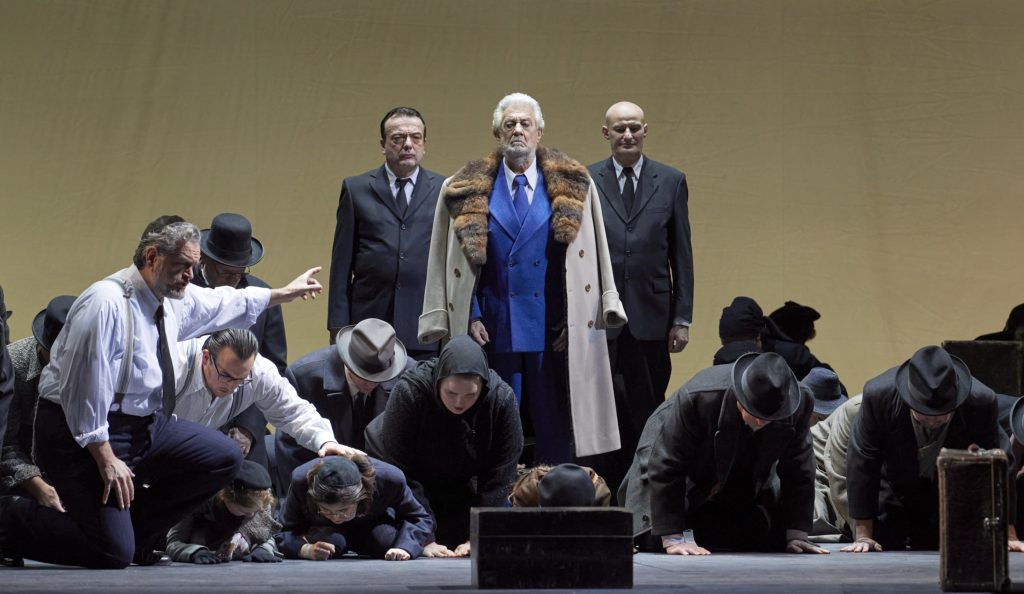Opening Part 1 Vienna’s huge supplemented Chorus bewail the desecration of their land. ‘We are slaves, but hear our prayer, and forgive our transgressions’. Do not let them sit on the throne of David! Hebrew script is projected onto a screen, like a biblical commentary. Their High Priest Zaccaria (Riccardo Zanelatto), exhorts them, trust to God and fight bravely. He’s sent them a sign, delivered the King’s daughter. ‘The sun of a happier day has risen for us’, sings Zaccaria. The Israelites chorus sing and dance like klezmer performers.
Verdi’s subject is a people downtrodden by alien political masters. Surely for Verdi, the Jews exiled from their land is the struggle of his own Italian people under the yoke of foreign oppressors (in 1840, French and Austrian.) So Verdi’s music -especially Nabucco– was taken up by the Risorgimento, a battle cry for a united Italy.
In the opera, Nabucco, the Assyrian King, has occupied Jerusalem, the Jews holed up in the Temple, his daughter hostage. But Verdi and librettist Solera add a love intrigue. Fenena (Szilvia Vörös), captured by the Jews’ High Priest, had once helped Ismaele (Freddie de Tommaso) escape from Babylon, where Abigaille, her half-sister, had held him captive. That Fenena is now rescued by Ismaele kindles the love triangle. Ismaele is a fugitive from his own Jewish people, torn between love and kindred loyalty.
The King and his henchmen are on the threshold of the Temple. (Zaccaria threatens to kill Fenena.) Domingo’s Nabucco, white-haired, blue-suited, Let them tremble at my anger, none will survive: Zion will perish in a bloodbath. Domingo, his legendary tenor somewhat lacking power, but astonishing; in absolute control of his vocal reserves. Bow down before me, he sings as their conqueror. Fenena is abducted by Ismaele. Nabucco rages, he’ll sack the Temple, while the Hebrews threaten revenge against Ismaele, excoriated.
As Ismaele, British-Italian de Tommaso is a fine tenor, but a little underwhelming, the role colourless. Black-suited, wearing a skull cap, in metal-rimmed glasses, he looks like a bookkeeper. In Verdi’s drama, they’ve been lovers since he was in Babylon. You betrayed your duty, they accuse him. But there’s a love triangle. Abigaille, the King’s other daughter – the fiery Anna Pirozzi- sings passionately of how she loved him, but was rejected. Now, if you love me, I will save your people. Sörös/Fenena bitterly responds, Save him and leave me to my tears. Fenena, now a convert, identifies with the Jews, speaks for ‘my people.’ Whereas Abigaille wears royal blue, against the stark white/black colour-coding of the Israelites.
 Mezzo Anna Pirozzi is outstanding as Abigaille, Verdi’s passionate, spurned lover suing for revenge. In her Act 2 aria, she holds a letter, she’s stolen. Her secret: she’s illegitimate! You are all deluded! Pirozzi’s Abigaille, passion unbridled, kneels, looks at herself in the mirror, her face lights up: she too once knew happiness. Backed by Verdi’s rousing chorus, she sings, on a glorious high note, Who will restore one day of that lost enchantment! Nabucco has invested Fenena his successor. But Abigaille will mount the blood-stained throne. She, once a humble slave girl, will have Princesses begging before her.
Mezzo Anna Pirozzi is outstanding as Abigaille, Verdi’s passionate, spurned lover suing for revenge. In her Act 2 aria, she holds a letter, she’s stolen. Her secret: she’s illegitimate! You are all deluded! Pirozzi’s Abigaille, passion unbridled, kneels, looks at herself in the mirror, her face lights up: she too once knew happiness. Backed by Verdi’s rousing chorus, she sings, on a glorious high note, Who will restore one day of that lost enchantment! Nabucco has invested Fenena his successor. But Abigaille will mount the blood-stained throne. She, once a humble slave girl, will have Princesses begging before her.
To a plaintive cello solo, Zaccaria, prays for the gift of prophesy, a miracle to convert the unbeliever, (Zanelatto’s bass gently delivered.) Ismaele begs for their mercy; the accursed man has no supporters. Tommaso is jostled by the Jewish congregation. But he’s saved by Fenena’s pleading as ‘a Hebrew woman’; and the King now returned.
Domingo is shaking; he’s struck mad by the revelation he’s a god. Domingo’s lifetime acting experience, its apotheosis in depicting an old man- like Shakespeare’s King Lear – suffering delusions of grandeur. Hear me, Babylonians, there is only one god, your King! Then Domingo holds his forehead, and collapses. Like Lear, with his daughter Cordelia, Nabucco reaches out to Fenena, to help him. Imagine Domingo on his knees, contrite: Why am I weeping? Abigaille, snatching Nabucco’s fallen crown, sings defiant: the splendour of Baal is endless.
Verdi’s Act 3 intermezzo, almost martial, brass, flutes predominate. The Hanging Gardens. The Hebrew script flickers, fades, perhaps suggesting tears falling. With Abigaille Queen, Prozzi’s regally ensconced, accompanied by Vienna’s lusty Chorus. Israel must die, demands Assyria’s Highpriest.
Domingo’s Nabucco, recovered, but shaky, as if he’s had a nervous breakdown. He tries to reimpose his authority, but no match for Abigaille, who demands he sign a death warrant for the Jews, (and Fenena.) Prozzi/Abigaille taunts him. He insists she bow to him. She, indignant, flaunts the proof of her origins. Domingo sings of the shame. She scolds, poor old man, shadow of the King you were. Wonderful pathos, Domingo frail, on his knees. (And the dramatic irony.)
Their scene is a high point. She’s defiant, Prozzi’s Abigaille full-blooded: they’ll kneel before her, she once a slave. Domingo surpasses himself. Appeals for compassion, forgive a father for his foolishness. Deh, pardonna, deh perdonna. All he begs is his daughter’s life. She, forgive! you beg in vain.
They- the Israelites- are lying like corpses on the Vienna stage, but holding pictures of loved ones, family. The backdrop to the sublime Slaves Chorus. Va Pensioro. They rise up. My beautiful homeland is lost! O memories so cherished. O grant us the strength to bear our sufferings. They each hold up black/white archived photos of Holocaust victims.
Then Zaccaria, sings, Why are they weeping: he sees into the dark future, the fall of Babylon, when their chains are broken.
The Chorus are facing us, dressed modestly in 1940s clothing – men wearing white shirts, braces, the women in black, or sombre, floral-patterned dresses. Judah shall rise again, proclaims Zaccaria. (And this from a stage in Vienna, whence so many Jews were driven out.)
Domingo’s Nabucco, out of his delirium, come to his senses, hears the band accompanying Fenena’s funeral procession. ‘Why is she in chains, weeping?’  Distraught, Nabucco realises, he’s a prisoner. And sings, God of the Hebrews forgive him. Domingo, hands reaching out, now kneeling, Dio di Guida! That voice, warm, miraculously expressive, Domingo perfectly cast as the old King. But no dodderer. Follow me, the wicked will fall! Assyria rise again!
Distraught, Nabucco realises, he’s a prisoner. And sings, God of the Hebrews forgive him. Domingo, hands reaching out, now kneeling, Dio di Guida! That voice, warm, miraculously expressive, Domingo perfectly cast as the old King. But no dodderer. Follow me, the wicked will fall! Assyria rise again!
Fenena and the condemned Hebrews gravely lined up, pray; the orchestra’s brass section, funereal. The firmament has opened, Vörös’ Fenena intensely moving, sings her soul is in flight. Domingo proclaims, Immenso Jehova, and, commandingly takes her by the hand. But distraught seeing a dishevelled Abigaille, who’s taken poison. Pirozzi frail, breaking with emotion, begs forgiveness.
A heartrending performance. The entire cast are on stage, applauding amongst themselves. And they paid tribute to ‘dear Placido’, who’s 80th birthday it was. © P.R. 22.1.2021
Photos: Anna Pirozzi (Abigaille); Placido Domingo (Nabucco); Scene Photo Szilvia Vörös and Vienna State Opera Chorus
© Wiener Staatsoper/ Michael Pöhn


My partner and I stumbled over here from a different page and thought I should check things out. I like what I see so now i’m following you. Look forward to looking into your web page for a second time.
You’ve the most impressive website.